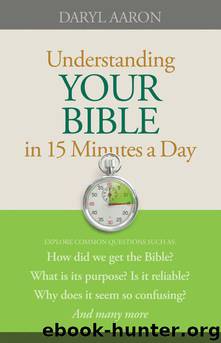Understanding Your Bible in 15 Minutes a Day by Daryl Aaron

Author:Daryl Aaron [Aaron, Daryl]
Language: eng
Format: epub
Tags: Christian Books & Bibles, Bible Study & Reference, Bible Study, Education & Reference, Religion & Spirituality, Bible & Other Sacred Texts, Bible, Christianity, Reference
ISBN: 9780764209628
Google: eVMKww7EE9wC
Amazon: B006K1MYAW
Goodreads: 13514262
Publisher: Baker Books
Published: 2012-02-01T06:00:00+00:00
FUN FACT
Not all the books that fit into the category of Epistles reflect this form. Hebrews ends like a letter but doesn’t start like one. First John does neither; it is probably a written sermon rather than a letter per se.
20
What Will I Find in the Book of Revelation?
This book is one of the most challenging in the Bible because of the type of literature it is. The title of the book can be literally translated: “The Apocalypse to John.” The apostle John is the human author (1:1, 4, 9). But the first verse adds that it is also the “apocalypse of Jesus Christ.” The Greek word apocalypse means “revealing” or “uncovering.” So the content of this book was revealed by Jesus Christ and recorded by the apostle John (1:1–3).
This book, then, falls into the category of apocalyptic literature. That places it within a body of Jewish literature that was written between about 200 BC and AD 100, a period of time when the Jews were suffering occupation and persecution at the hands of Gentiles. Because of these hard times, the Jews were wondering about the great promises in the Old Testament prophets regarding the coming of the Messiah and the glories of the Jewish kingdom. The fulfillment of these promises seemed very remote and the Jews were discouraged. This body of literature was produced to remind the Jews that although times were tough, God’s promises would be fulfilled.
These are the characteristics of apocalyptic literature: (1) the ending of the present age, which is characterized by evil; that is, the culmination of the age-old war between good and evil, God and Satan; (2) the resurrection and final judgment of all people; (3) the transformation of the universe with the effects of sin being removed; (4) the ushering in of a new age—the messianic kingdom; (5) this taking place through a cataclysmic intervention of God into human history and the physical realm; and (6) usually communicated through visions, symbolism, and imagery, often of a rather bizarre nature, as in a bad dream.
A few Old Testament prophetic books, such as the latter half of Daniel and parts of Ezekiel and Zechariah, were written before the period of apocalyptic literature, but some of its characteristics were anticipated in them. As a matter of fact, the book of Revelation cannot be understood apart from this Old Testament background, especially the book of Daniel.
Many of the characteristics of apocalyptic literature are also seen in the book of Revelation, but there are also a few differences between Revelation and other such literature. Apocalyptic literature falsely (pseudonymously) named great Old Testament characters as the authors, such as Moses, Enoch, or Ezra. However, John accurately identifies himself as the author of Revelation. Apocalyptic literature was normally pessimistic about the present and optimistic about the future. While Revelation is realistic about the challenges for the people of God in the present, it is optimistic about both the present and the future due to the successful work of Jesus Christ at his first coming.
Download
This site does not store any files on its server. We only index and link to content provided by other sites. Please contact the content providers to delete copyright contents if any and email us, we'll remove relevant links or contents immediately.
The Five People You Meet in Heaven by Mitch Albom(3550)
The Secret Power of Speaking God's Word by Joyce Meyer(3167)
Real Sex by Lauren F. Winner(3006)
Name Book, The: Over 10,000 Names--Their Meanings, Origins, and Spiritual Significance by Astoria Dorothy(2978)
The Holy Spirit by Billy Graham(2942)
0041152001443424520 .pdf by Unknown(2843)
How The Mind Works by Steven Pinker(2811)
ESV Study Bible by Crossway(2773)
Ancient Worlds by Michael Scott(2680)
Churchill by Paul Johnson(2577)
The Meaning of the Library by unknow(2564)
The ESV Study Bible by Crossway Bibles(2547)
The Gnostic Gospels by Pagels Elaine(2527)
MOSES THE EGYPTIAN by Jan Assmann(2411)
Jesus by Paul Johnson(2351)
City of Stairs by Robert Jackson Bennett(2339)
The Complete Dead Sea Scrolls in English (7th Edition) (Penguin Classics) by Geza Vermes(2270)
The Nativity by Geza Vermes(2226)
Ancient Near Eastern Thought and the Old Testament by John H. Walton(2221)
